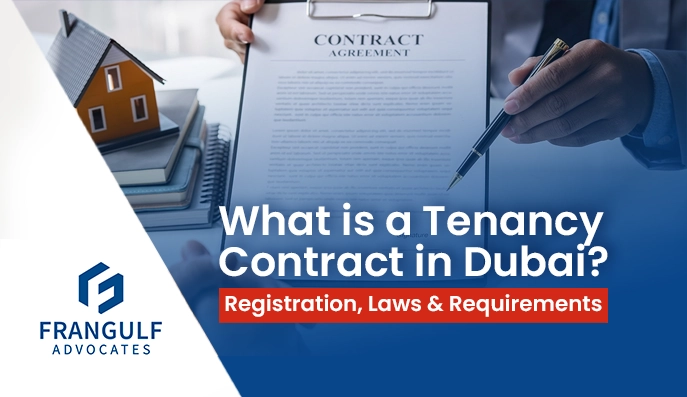Understanding Dubai Real Estate Laws: What Every Buyer and Seller Should Know

Table of Contents
- The Legal Foundation: Understanding Dubai’s Real Estate Framework
- Property Ownership Laws: Who Can Own What?
- Unsure which ownership type suits your investment goals?
- Property Registration and Transaction Process
- Dubai Tenancy Laws and Rental Regulations
- Facing a rental dispute or unfair treatment?
- Off-Plan Property Regulations
- Considering an off-plan purchase?
- Special Regulations and Considerations
- Compliance and Penalties
- Worried about legal compliance?
- Recent Legal Updates and Trends for 2025
- When to Seek Legal Assistance
- Ready to navigate Dubai’s evolving property landscape with confidence?
- Conclusion
- Got a Question on Real Estate Laws?
In excess of AED 520 billion in real estate deals in 2024, Dubai’s property market is once again proving to be a destination of international investment. But beneath the staggering numbers exists a complex system of laws that must be approached with utmost care by every purchaser, vendor, investor, and tenant. It’s not only about being compliant—it’s about safeguarding your investment, securing your rights, and making informed choices in one of the world’s most vibrant property markets.
Whether you’re buying your first Dubai Marina apartment, renting Business Bay commercial space, or investing in off-plan properties, this in-depth guide will take you through the most important real estate laws in Dubai. As experts at FranGulf Advocates & Legal Consultants LLC, with more than a decade of experience providing our UAE clients with top-tier services since 2011, we’ve seen firsthand how sound legal advice can make all the difference between a successful deal and expensive complexities.
The Legal Foundation: Understanding Dubai’s Real Estate Framework
The real estate business in Dubai is governed by a well-established legal structure aimed at safeguarding stakeholders while encouraging market transparency and development. This is important for anyone dealing with the property market.
Governing Authorities
Dubai Land Department (DLD) governs all property-related transactions within the emirate. The DLD is tasked with registering properties, issuing title deeds, and market regulation. In recent years, the department has led large-scale digitalization initiatives such as blockchain-based registration of properties and smart services that have significantly streamlined transactions.
Real Estate Regulatory Agency (RERA), which is under the umbrella of the DLD, is tasked with specifically overseeing tenant-landlord relations, licensing real estate practitioners, and overseeing market compliance. RERA is an essential element to safeguard just practices and settle disputes through the Rental Dispute Centre.
Key Legislation
The legal structure for the real estate industry in Dubai is based on a number of foundational laws:
- Federal Law No. 5 of 1985 (UAE Civil Code) establishes the general legal principles applicable to contracts and property rights
- Law No. 7 of 2006 regulates property ownership and registration process
- Law No. 13 of 2008 deals with off-plan property regulations and buyer protection exclusively
- Law No. 27 of 2007 (popularly referred to as the Strata Law) deals with jointly owned properties
- Law No. 26 of 2007 created RERA and regulates tenancy relationships
Dubai has a civil law system that includes Sharia principles, and both federal and emirate-level jurisdiction. Special economic zones such as the Dubai International Financial Centre (DIFC) and Abu Dhabi Global Market (ADGM) have independent legal systems based on common law principles, presenting distinctive considerations for such properties within these jurisdictions. For matters involving civil law disputes, specialized legal expertise becomes essential.
Property Ownership Laws: Who Can Own What?
Understanding the categories of ownership is pivotal in making informed investment choices in Dubai’s property sector.
Freehold Ownership
Freehold ownership confers full ownership rights over the property and the land it sits on. This is the most extensive type of property ownership in existence and is currently open to foreign nationals in specific areas. Freehold owners have permanent ownership rights with the option to sell, lease, or transfer property freely.
Large freehold areas in Dubai are:
- Dubai Marina and Jumeirah Beach Residence (JBR)
- Downtown Dubai and Business Bay
- Palm Jumeirah and Palm Jebel Ali
- Dubai Sports City and Motor City
- Dubai Silicon Oasis and International Media Production Zone
- Arabian Ranches and Emirates Hills
Leasehold Ownership
Leasehold options offer long-term leases, which are normally for 99 years with renewal clauses. Although leaseholders do not have title to the land, they have significant rights of occupation and development throughout the term of the lease. These options usually carry certain usage terms that need to be read with great care.
Usufruct Rights
Usufruct rights authorize foreign investors to use and enjoy property for defined periods, usually from 10 to 99 years. This arrangement has been especially appealing to international investors who desire long-term yield without complications of ownership.
Foreign Ownership Regulations
The UAE has increasingly opened up opportunities for foreign ownership. Foreigners and GCC nationals can now own property in specially marked freehold and investment zones. Increased reforms have further increased the size of the zones to the dismay of some, as Dubai seeks more international investment. Compliance with registration requirements and zone-specific rules is still a requirement.
Ownership spans residential, commercial, and off-plan properties, with multiple investor joint ownership schemes offered. All three types have different legal considerations that should be clearly realized before any transaction can be made.
Unsure which ownership type suits your investment goals?
Speak with our property law experts to make an informed decision.

Property Registration and Transaction Process
Legitimate registration with the Dubai Land Department is not a choice—it’s legally mandatory that secures your right to own and guarantees the validity of the transaction.
Registration Requirements
All property deals have to be registered with the DLD in order to receive a legitimate title deed. Registration involves some important documents:
- Resident valid passport and Emirates ID
- Developer No Objection Certificate (NOC)
- Certificate of property valuation
- Sale and purchase contract
- Evidence of payment
- Form F (property transfer form)
Working with experienced real estate lawyers ensures all documentation is properly prepared and submitted.
Pro Tip: Schedule your DLD property transfer appointment during off-peak hours (early morning or mid-afternoon) to avoid long wait times. Online booking is available and highly recommended.
Transaction Steps
The general steps involved in a typical Dubai property transaction are as follows:
- Memorandum of Understanding (MOU): Preliminary agreement stating general terms and conditions
- Due Diligence: Extensive research on property status, ownership history, and legal restrictions
- Sale and Purchase Agreement: Thorough contract outlining all terms of the transaction
- Payment and Escrow: Funds paid in accordance with agreed schedule, usually through escrow for off-plan developments
- Property Transfer at DLD: Physical or remote presence at DLD for formal transfer
- Title Deed Issuance: Formal ownership document demonstrating legal title
Fees and Costs
- Dubai property transactions entail a number of standard charges:
- DLD registration fee: 4% of property value
- Trustee office fees (where applicable)
- Real estate agency commission: normally 2% of transaction value
- Legal fees for professional legal representation and due diligence
At FranGulf Advocates, we recommend budgeting approximately 7-8% of the property value for total transaction costs, including legal representation, to ensure comprehensive protection throughout the process.
Dubai Tenancy Laws and Rental Regulations
Dubai’s tenancy system, regulated largely by Law No. 26 of 2007, sets forth definitive rights and responsibilities for landlords and tenants, ensuring market stability and ethical practices.
Ejari Registration
All tenancy agreements need to be registered via the Ejari system, which translates as “My Lease” in Arabic. Mandatory registration safeguards both parties and is the formal record of the tenancy relationship. Non-registration may lead to penalties and issues with utility connections.
Tenant Rights
- Tenants have considerable protections:
- Landlords need to give 90 days’ notice prior to raising rent
- Rent increases are capped based on the RERA rental calculator, which considers average market rates
- Security deposits are limited to 5% of annual rent for unfurnished properties and 10% for furnished units
- Properties must meet specific condition standards and habitability requirements
Facing a rental dispute or unfair treatment?
Our lawyers can help you enforce your rights and secure fair resolutions.

Landlord Rights and Obligations
- Property owners maintain rights to:
- Terminate tenancies for specific legal grounds, including personal use, property sale, or renovation
- Access properties for maintenance with proper notice
- Collect rent according to contract terms
But landlords have to meet maintenance requirements and cannot unilaterally evict tenants without going through proper legal process.
Dispute Resolution
Rental Dispute Centre (RDC), functioning under RERA, offers specialized facilities for the settlement of tenancy disputes. Normal disputes include rent rises, maintenance, return of security deposit, and eviction orders. Legal representation greatly enhances results in RDC hearings, with proper documentation and arguments. Our team has extensive experience handling civil disputes related to property matters.
PRO TIP: Take timestamped photos and videos of your rental property during move-in and move-out. This documentation is invaluable if disputes arise over security deposit deductions or property damage claims.
Off-Plan Property Regulations
Dubai’s off-plan market presents considerable potential but demands cautious maneuvering of protective regulations with the intention of protecting buyer interests.
Legal Framework
Law No. 13 of 2008 sets out far-reaching protections for off-plan buyers, and Law No. 8 of 2007 sets out escrow account requirements. The regulations protect buyer payments and utilize them solely for the intended project development.
Developer Obligations
Developers are obligated to:
- Sustain individual escrow accounts for every project
- Comply with approved construction schedules
- Comply with specific registration and licensing requirements
- Incur heavy penalties for violations or delay
Oqood’s system offers interim registration, which gives buyers protection even prior to project completion and final issuance of title deeds.
Buyer Protections
Off-plan buyers enjoy:
- Refund entitlement in the event of project cancellation
- Regulated payment plans linked to construction stages
- Specific standards for property handover
- Defect liability periods in which the developers shall correct quality defects
Considering an off-plan purchase?
Protect yourself with professional legal review before signing any agreements.

2025 Updates
Recent regulatory upgrades further fortified purchaser protections through increased developer compliance enforcement and monitoring mechanisms. The DLD has implemented stricter financial solvency tests for developers as well as enhanced penalties for non-compliance.
Special Regulations and Considerations
Aside from general ownership and tenancy legislation, a number of specialized statutes impact individual property situations.
Jointly Owned Property (Strata Law)
Law No. 27 of 2007 regulates multi-unit complexes, instituting requirements for owners’ associations, service charge provisions, and common area management. Familiarity with strata law is crucial for those buying apartments or units in shared buildings, as it determines maintenance responsibilities, voting rights, and mechanisms for resolving disputes.
Property Inheritance Laws
Property inheritance in the UAE has specific considerations, especially for foreigners. Although Sharia law generally applies to inheritance, foreign nationals may have their wills registered under the DIFC Wills Service Centre, which enables them to transfer property as they do in their country of origin or as they wish. Succession planning is important to prevent heirs from facing challenges .Our family law specialists can provide comprehensive guidance on inheritance matters.
Mortgage and Financing Rules
UAE Central Bank sets lending ceilings in the form of maximum loan-to-value ratios, varying between UAE nationals and expatriates, first-time buyers and other property purchases. Eligibility, interest rates, and mortgage registration vary from institution to institution, requiring cautious comparison and expert advice.
Real Estate Agency Regulations
RERA licensing guarantees that only trained and qualified professionals can handle property transactions. Licensed agents are also subject to strict codes of conduct, uniform commission rates, and consumer protection stipulations. Buyers and sellers must check agent qualifications using the RERA website prior to hiring them.
Compliance and Penalties
Knowledge of possible breaches and penalties ensures legal compliance and does not incur unnecessary penalties.
Common Violations
Most common breaches include:
- Unregistered property dealings or tenancy agreements
- Unauthorized property usage (residential properties used commercially)
- Rental law violations, including illegal evictions or excessive rent increases
- Developer non-compliance with escrow or construction timeline requirements
Consulting real estate lawyers before any transaction helps ensure compliance and avoid these costly violations.
Worried about legal compliance?
Let our team review your property matters to avoid penalties and complications.

Penalties
Violations can result in:
- Substantial financial fines
- Transaction cancellation
- License revocation for real estate professionals
- Legal proceedings that may include criminal sanctions in severe cases
- Enforcement Mechanisms
The DLD and RERA have ongoing monitoring and inspection schemes. The two agencies offer complaint procedures for affected individuals to report infractions. Legal recourse is available through specialized rental dispute courts and general civil courts, depending on the dispute nature.
Recent Legal Updates and Trends for 2025
Dubai’s real estate legal environment keeps changing to accommodate market needs and global best practices.
Regulatory Updates
Recent updates include:
- Increased foreign ownership areas in targeted mainland regions
- Increased digital transformation projects, such as virtual property registration and blockchain title deeds
- Increased consumer protection, specifically for off-plan purchasers
- Simplified licensing processes for property professionals
Rising Legal Concerns
The market is facing some of the modern challenges:
- Regulations on short-term rentals targeting operators such as Airbnb, with specific licensing conditions and operating limitations
- Acceptance of cryptocurrencies in property transactions, with new regulatory schemes needed
- Environmental standards encouraged through building regulations
- Smart contract deployment and integration of blockchain technology into property transactions
These innovations are a testament to Dubai’s determination to remain a top global real estate destination while safeguarding stakeholder interests.
When to Seek Legal Assistance
While some simple transactions can go through without extensive legal intervention, several circumstances necessitate expert legal advice.
Essential Situations Necessitating Legal Advice
Expert legal help becomes necessary for:
- Complex property transactions across multiple stakeholders or jurisdictions
- Title or ownership disputes
- Off-plan development delay or cancellation
- Tenancy disputes, particularly those reaching RDC
- Inheritance issues relating to property
- Foreign investment planning to maximize legal and tax benefits
- Mortgage disputes or foreclosure cases
Advantages of Expert Legal Assistance
- Expert real estate attorneys offer:
- Detailed contract review and negotiation
- Thorough due diligence to spot potential problems prior to transaction closing
- Competent dispute resolution and litigation advocacy
- Compliance guarantee avoiding expensive breaches
- Strategic risk management safeguarding your investment
FranGulf’s Real Estate Legal Services
At FranGulf Advocates & Legal Consultants LLC, our property practice integrates in-depth legal knowledge with market experience. For over a decade, since 2011, we’ve helped thousands of clients with real estate transactions, disputes, and compliance with regulations throughout Dubai, Sharjah, and the UAE at large.
Our integrated services are:
- Property buying and selling
- Drafting tenancy agreements and tenancy disputes
- Off-plan project consultancy
- Litigation and arbitration in real estate
- Title search and due diligence
- Regulatory compliance consulting
Our staff offers customized attention, open communication, and effective solutions that suit your unique circumstances. We offer 24/7 emergency assistance and have secure digital channels for convenient client interaction.
Ready to navigate Dubai’s evolving property landscape with confidence?
Partner with experienced legal counsel who stays ahead of regulatory changes

Conclusion
The legal framework of Dubai real estate is one of the most complex and sheltering property systems in the Middle East. Knowledge of these regulations is not only about compliance; it’s about taking intelligent decisions, guarding your investment, and optimizing opportunities within this vibrant market.
The law remains dynamic, with periodic revisions reflecting current market imperatives and global best practices. As a first-time buyer, seasoned investor, landlord, or renter, being aware of Dubai property legislation means safe, seamless transactions.
Don’t try to tackle Dubai’s complicated real estate legal environment alone. The risks are too great, and the laws too complex, to take a chance on making it through on your own.
Require professional legal advice for your property transaction in Dubai? Call FranGulf Advocates & Legal Consultants LLC for a confidential consultation. Our seasoned real estate attorneys are prepared to serve your interests and assist you to succeed in Dubai’s property arena.
Got a Question on Real Estate Laws?
Can foreigners own property anywhere in Dubai?
No, foreign ownership is restricted to designated freehold and investment zones. However, these zones cover extensive areas including popular locations like Dubai Marina, Downtown Dubai, and Palm Jumeirah. GCC nationals have broader ownership rights throughout Dubai.
What is the difference between freehold and leasehold?
Freehold ownership grants complete ownership of both property and land indefinitely, while leasehold provides long-term lease arrangements (typically 99 years) where you own the property but not the underlying land. Freehold offers more flexibility and typically higher resale values.
Is Ejari registration mandatory for all tenancies?
Yes, all residential and commercial tenancy contracts in Dubai must be registered through the Ejari system. This registration is mandatory for utility connections and provides legal protection for both landlords and tenants.
What happens if a developer fails to complete an off-plan project?
Buyers are protected through mandatory escrow accounts and Law No. 13 of 2008. If a project is cancelled, buyers are entitled to refunds. If delays occur, developers may face penalties, and buyers can pursue legal remedies including compensation claims.
Do I need a lawyer to buy property in Dubai?
While not legally mandatory, engaging a qualified real estate lawyer is highly recommended. Professional legal representation ensures proper due diligence, contract review, compliance verification, and protection of your interests throughout the transaction.
What are my rights as a tenant in Dubai?
Tenants enjoy substantial protections including 90-day notice requirements for rent increases, capped rent increases based on RERA calculations, security deposit limits, and protection against arbitrary eviction. All rights are enforceable through the Rental Dispute Centre.
Facing a Legal Challenge? We’re Just One Call Away
Confidential, expert, and results-driven legal advice.







